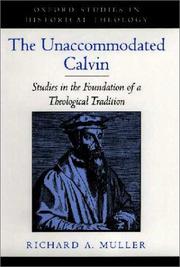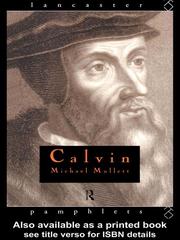| Listing 1 - 10 of 134 | << page >> |
Sort by
|
Object
Abstract | Keywords | Export | Availability | Bookmark
 Loading...
Loading...Choose an application
- Reference Manager
- EndNote
- RefWorks (Direct export to RefWorks)
Numismatics. --- Calvijn, Johannes, --- Medals.
Book
Year: 1955 Publisher: Milano : Vita e Pensiero,
Abstract | Keywords | Export | Availability | Bookmark
 Loading...
Loading...Choose an application
- Reference Manager
- EndNote
- RefWorks (Direct export to RefWorks)
Theologie. --- Filosofie. --- Calvijn, Johannes
Book
Year: 1986 Publisher: Brussel Koninklijke Bibliotheek Albert I
Abstract | Keywords | Export | Availability | Bookmark
 Loading...
Loading...Choose an application
- Reference Manager
- EndNote
- RefWorks (Direct export to RefWorks)
Book
ISBN: 2877180522 9782877180528 Year: 1990 Volume: vol *9 Publisher: Flavion Le phare
Abstract | Keywords | Export | Availability | Bookmark
 Loading...
Loading...Choose an application
- Reference Manager
- EndNote
- RefWorks (Direct export to RefWorks)
Book
Year: 1984 Publisher: Genève Droz
Abstract | Keywords | Export | Availability | Bookmark
 Loading...
Loading...Choose an application
- Reference Manager
- EndNote
- RefWorks (Direct export to RefWorks)

ISBN: 1280655275 9786610655274 0198027648 0195348567 1423763084 9780198027645 9781423763086 019511681X 0197741800 Year: 2023 Publisher: New York : Oxford University,
Abstract | Keywords | Export | Availability | Bookmark
 Loading...
Loading...Choose an application
- Reference Manager
- EndNote
- RefWorks (Direct export to RefWorks)
Calvin, Jean, --- Calvijn, Johannes --- Calvin, Jean --- Calvinus, Johannes
Book
ISBN: 1282437569 9786612437564 0300159811 9780300159813 9781282437562 0300120761 9780300120769 6612437561 Year: 2009 Publisher: New Haven [Conn.] London Yale University Press
Abstract | Keywords | Export | Availability | Bookmark
 Loading...
Loading...Choose an application
- Reference Manager
- EndNote
- RefWorks (Direct export to RefWorks)
During the glory days of the French Renaissance, young John Calvin (1509-1564) experienced a profound conversion to the faith of the Reformation. For the rest of his days he lived out the implications of that transformation-as exile, inspired reformer, and ultimately the dominant figure of the Protestant Reformation. Calvin's vision of the Christian religion has inspired many volumes of analysis, but this engaging biography examines a remarkable life. Bruce Gordon presents Calvin as a human being, a man at once brilliant, arrogant, charismatic, unforgiving, generous, and shrewd.The book explores with particular insight Calvin's self-conscious view of himself as prophet and apostle for his age and his struggle to tame a sense of his own superiority, perceived by others as arrogance. Gordon looks at Calvin's character, his maturing vision of God and humanity, his personal tragedies and failures, his extensive relationships with others, and the context within which he wrote and taught. What emerges is a man who devoted himself to the Church, inspiring and transforming the lives of others, especially those who suffered persecution for their religious beliefs.
Protestants --- Christians --- Calvin, Jean, --- Calvijn, Johannes --- Calvin, Jean --- Calvinus, Johannes

ISBN: 1134989911 1280567244 9786610567249 0203129695 9780203129692 9780415000574 0415000572 0415000572 9781134989911 9781280567247 6610567247 9781134989867 9781134989904 9781138151987 1860130763 Year: 1989 Publisher: London Routledge
Abstract | Keywords | Export | Availability | Bookmark
 Loading...
Loading...Choose an application
- Reference Manager
- EndNote
- RefWorks (Direct export to RefWorks)
In this lucid and readable study, Michael Mullet explains the historical importance of a man and a movement whose influence are still felt in the modern world. The pamphlet locates John Calvin in the context of early 16th-century France and then charts his emergence as an influential theologian and civic religious leader in the 'second generation' of reformers following Luther. After exploring the main lines of Calvin's theology, set out in the Institutes, the central section deals with the difficult process by which his authority was imposed on, or accepted by, Geneva. Finally, the
Reformation --- Calvin, Jean, --- Calvijn, Johannes --- Calvin, Jean --- Calvinus, Johannes --- France --- Italy --- Church history --- Calvin, John
Book
ISBN: 9789043514361 Year: 2008 Publisher: Kampen Kok
Abstract | Keywords | Export | Availability | Bookmark
 Loading...
Loading...Choose an application
- Reference Manager
- EndNote
- RefWorks (Direct export to RefWorks)
Christian theology --- Calvin, John --- #GGSB: Protestantisme --- Calvin, Jean --- Calvijn, Johannes --- Calvinus, Johannes --- Protestantisme
Book
ISBN: 1108631649 1108571018 1108473040 1108668585 Year: 2019 Publisher: Cambridge : Cambridge University Press,
Abstract | Keywords | Export | Availability | Bookmark
 Loading...
Loading...Choose an application
- Reference Manager
- EndNote
- RefWorks (Direct export to RefWorks)
Calvin's 1559 Institutes is one of the most important works of theology that emerged at a pivotal time in Europe's history. As a movement, Calvinism has often been linked to the emerging features of modernity, especially to capitalism, rationalism, disenchantment, and the formation of the modern sovereign state. In this book, Michelle Sanchez argues that a closer reading of the 1559 Institutes recalls some of the tensions that marked Calvinism's emergence among refugees, and ultimately opens new ways to understand the more complex ethical and political legacy of Calvinism. In conversation with theorists of practice and signification, she advocates for reading the Institutes as a pedagogical text that places the reader in the world as the domain in which to actively pursue the 'knowledge of God and ourselves' through participatory uses of divine revelation. Through this lens, she reconceives Calvin's understanding of sovereignty and how it works in relation to the embodied reader. Sanchez also critically examines Calvin's teaching on providence and the incarnation in conversation with theorists of political theology and modernity who emphasize the importance of those very doctrines.
Calvin, Jean, --- Calvijn, Johannes --- Calvin, Jean --- Calvinus, Johannes --- Political and social views.
| Listing 1 - 10 of 134 | << page >> |
Sort by
|

 Search
Search Feedback
Feedback About UniCat
About UniCat  Help
Help News
News